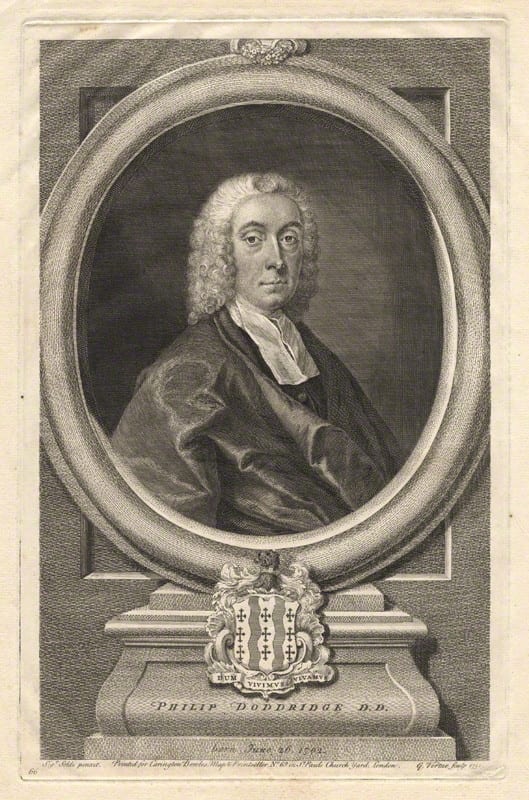
Ramsay, Allan; Sir David Dalrymple, Bt, Lord Hailes; The National Trust for Scotland, Newhailes; http://www.artuk.org/artworks/sir-david-dalrymple-bt-lord-hailes-197266
All that now remains is to recapitulate briefly the Five secondary causes, which, in the judgement of Mr Gibbon, “so efficaciously assisted the truth of the Christian religion.”
His first proposition, as we have seen, is, that Christianity became victorious over the established religions of the earth, by its very doctrine, and by the ruling providence of its great Author; and his last, of a like import, is, That Christianity Is The Truth.
Between his first and his last propositions, there are, no doubt, many dissertations, digressions, inferences, and hints, not altogether consistent with his avowed principles. But much allowance ought to be made for that love of novelty which seduces men of genius to think and speak rashly; and for that easiness of belief, which inclines us to rely on the quotations and commentaries of confident persons, without examining the authors of whom they speak.
- The first secondary cause of the rapid growth of Christian religion is said to have been, “The inflexible and intolerant zeal of “the Christians;” a zeal, when unsupported, and even repressed by secular power, or all things the most likely to check, instead of accelerating the growth of Christianity.
- “The doctrine of a future life, improved by every additional circumstance which “could give weight or efficacy to that important truth.” This, however, must have been a primary, and not a secondary cause of the rapid growth of Christianity: for, if we may credit St Paul, “Christ has abolished death, and has brought life and immortality to light, through the gospel.”
- “The supernatural gifts ascribed to the “Christians.” This, if understood of miraculous powers really exercised, ought to be ranked among the primary causes of the rapid growth of Christianity; if understood of “lying wonders,” it is hard to say, when the Pagans, who had fictitious miracles of their own, should have rejected them, and adopted what, in the present argument, must be considered as fables, the invention of a hated and persecuted sect.
- “The virtues of the primitive Christians” Mr Gibbon admits, not only that they were virtuous, but also that they were more virtuous than their Heathen contemporaries. But what made them to different from others? Let us answer, till we are better informed. “The grace of God that bringeth salvation, hath appeared to all men; teaching us, that, denying ungodliness, and worldly lusts, we should live soberly, righteously, and godly in this present world; looking for that blessed hope, and the glorious appearing of the great God, and our Saviour Jesus Christ, who gave himself for us, that he might redeem us from all iniquity, and purify unto himself a peculiar people, zealous of good works.” So if the virtues of the primitive Christians did contribute, in some measure, to the rapid growth of Christianity, we must ascribe such efforts, not to any secondary cause, but to the primitive cause of those virtues, the grace of God.
- “The union and discipline of the Christian republic.” This indeed would have strengthened the church, if not augmented the number of believers; but between the apostolical times and the accession of Constantine, the Christians were not so studious as became them in preserving “the unity of the Spirit in “the bond of peace;” neither was discipline, at all times, regularly and prudently maintained among them. We read in Mr Gibbon of “the mutual hostilities of the clergy, which sometimes disturbed the peace of the infant church;” of their turbulent passions, tinctured with an additional degree of bitterness and obstinacy from the infusion of spiritual zeal;” of “the ambition of the Roman Pontiff, and the absolute sway of Cyprian over Carthage, and the provincial synods;” of “a controversy carried on without effusion of blood, which was owing much less to the moderation than to the weakness of the parties;” and of “invectives and excommunications reciprocally hurled with equal fury and devotion;” of discordant councils;” of “the lofty titles of metropolitans and primates which aspiring bishops acquired;” and of “the emulation of pre-eminence and power which prevailed among the metropolitans themselves.” There also we read of bishops “who were unfaithful stewards of the riches of the church, and lavished them in sensual pleasures, or perverted them to the purposes of private gain, of fraudulent purchases, and of rapacious usury.” All this, and more to the like purpose, is related in a section which professedly treats of the mighty consequences arising from “the unions and discipline of the primitive church.” Thus it appears, that the things which Mr Gibbon considered as secondary or human causes, efficaciously promoting the Christian religion, either tended to retard its progress, or were the manifest operations of the wisdom and power of God.
Sir David Dalrymple (Lord Hailes), An Inquiry into the Secondary Causes which Mr. Gibbon has Assigned for the Rapid Growth of Christianity (Edinburgh: J. Ritchie, for A Johnstone, Grass-Market, 1808) pp. 332-338



